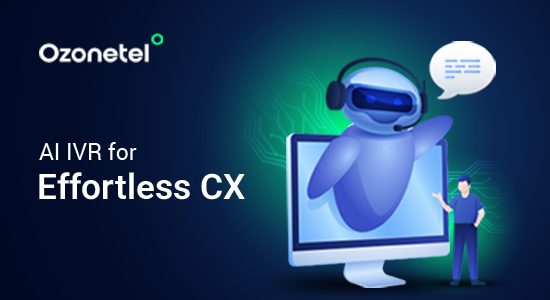- Resources
- AI in Digital Transformation: Key Benefits, Examples & Trends
AI in Digital Transformation: Key Benefits, Examples & Trends

Artificial intelligence covers a wide range of technologies and approaches, including robots, machine learning, and natural language processing. In contrast, digital transformation involves integrating digital technology into all parts of an organization, substantially altering how it operates and provides value to customers.
Now, these two concepts are closely linked since AI technologies act as catalysts for digital innovation. AI powers automation, data analysis, and intelligent decision-making, which are all key components of digital transformation.
The relationship between AI and digital transformation leads to increased productivity and better customer experiences. Read along to know more about the role of AI in digital transformation!
What Is Customer Onboarding?
The customer onboarding process focuses on nurturing new customers—ensuring they are properly set up, familiar with your product, and comfortable using it. The purpose of customer onboarding is to provide value to your consumers as soon as possible so that they continue to return to your product and quickly embrace it as part of their regular work routine.
What Is AI in Digital Transformation?
AI digital transformation is a strategic initiative in which a company embraces and integrates artificial intelligence (AI) into its operations, products, and services to increase innovation, efficiency, and growth. AI transformation improves organizational workflows by utilizing a variety of AI models and other technologies to create a dynamic and adaptable firm.
Unlike traditional automation, AI-powered processes can respond to new data or unanticipated changes. That is its primary benefit. AI programs learn from success and failure without the constraints of fixed outputs. They can self-correct and evaluate data to predict upcoming obstacles.
For example, Red Roof Inn uses AI-based analytics to track real-time airline cancellation information. This prompted the company to engage in mobile search optimization for areas around certain airports, which raised conversion rates by 375% in those areas.
How AI Accelerates Digital Transformation
So, how does artificial intelligence enable digital transformation across industries? Let’s find out:
Intelligent Automation
The use of AI in digital transformation improves automation by incorporating intelligence into ordinary activities. It entails automating complex decision-making processes and reacting to changing circumstances. Intelligent automation not only speeds up procedures, but it also increases accuracy and lowers errors, resulting in more reliable and efficient operations.
Operational Efficiency
AI-powered automation extends beyond typical rule-based operations. Machine learning algorithms allow automation systems to adapt and learn from past experiences, increasing their flexibility and efficiency. It improves operational workflows, lowers manual labor, and enables enterprises to attain higher levels of efficiency.
Proactive Problem Solving
Unlike traditional systems, which follow predefined rules, AI systems can be proactive. They continuously evaluate data in real time, enabling businesses to foresee difficulties and opportunities. This proactive approach improves company resilience, allowing firms to address issues before they become crucial and adjust quickly to changing conditions.
Decision Support and Predictive Analytics
The significance of AI in digital transformation enables better decision-making through enhanced analytics and predictive modeling. By evaluating previous data and recognizing patterns, AI systems can help with forecasting, risk management, and strategic planning. It provides decision-makers with useful information, allowing them to make informed decisions that are consistent with company goals.
Data Analysis and Insights
AI substantially helps with data analysis and insights. It rapidly processes massive amounts of complicated data, improves the processes of cleaning, examining, and modeling structured and unstructured data, and reveals hidden patterns to generate actionable insights.
AI enables real-time data analysis by finding patterns and anomalies in real time, aggregating unstructured data, facilitating immediate consumer interactions, and managing and analyzing enormous volumes of data at high speeds.
Benefits of AI in Digital Transformation
AI can provide various benefits and chances for your digital transformation, including:
Increased profitability
To maximize revenues, AI automates tedious jobs, accelerates processes, and makes data-driven decisions. It automates monotonous processes, lowers labor costs, and frees up human personnel to focus on more important tasks, such as using AI-powered chatbots to handle consumer concerns.
Real-time knowledge
AI can scan data in real time, providing continuous insights that drive business choices and improve operations. Businesses can use this data to identify patterns, predict client demands, and make required modifications.
Enhanced analytics
AI improves data analysis and insights by efficiently processing large datasets in order to extract insights, find patterns, and predict future trends. Additionally, AI-powered analytics enable the precise study of large data sets, the detection of trends, and anomalies to improve the data analysis process.
Automate your workflows
AI can help you automate repetitive, manual, or mundane operations and workflows, freeing up your time and resources to focus on more strategic and creative projects. For example, AI can assist you in automating data entry, processing, analysis, and reporting processes, hence decreasing errors and delays.
New value propositions
AI can assist you in developing new value propositions and business models that will differentiate you from your competitors, establish new markets, or disrupt existing ones by introducing new tactics, methods, or approaches.
For example, AI can assist you in developing new value propositions and business models by utilizing recommender systems, personalization, or segmentation, that may offer you with new ways to target, reach, or serve your clients.
Improve your performance
AI can help you enhance your performance and scalability by allowing you to tackle more complicated, dynamic, or large-scale challenges and scenarios, resulting in more flexible, adaptive, and scalable solutions.
AI, for example, can help you improve your performance and scalability by leveraging cloud, edge, or distributed computing, giving you access to greater processing power, storage, and network capabilities.
How AI-Driven Digital Transformation is Revolutionizing CX Across Industries
AI has had a significant impact on digital transformation in a variety of industries, including:
Ecommerce
In ecommerce, AI enhances shopping by providing personalized purchase recommendations and voice-activated shopping options. For example, Amazon’s AI-driven voice assistant, Alexa, allows customers to make purchases using simple voice commands.
This not only streamlines the buying process but also builds convenience into everyday shopping. With AI-based facial recognition and automated stores like Amazon Go, businesses can further elevate user experiences by removing friction points during the buying journey.
Healthcare
AI-powered speech analytics are reshaping healthcare by automating customer support and improving service quality. India’s National Health Authority (NHA), for instance, uses AI-driven solutions to monitor and analyze calls, ensuring that healthcare advisors provide better service to millions.
Moreover, AI helps automate feedback collection, identify training needs, and reduce response times, which leads to higher patient satisfaction and efficient healthcare delivery.
Banking
AI plays a critical role in the banking sector by automating sales processes and reducing response times. Non-banking financial companies (NBFCs) have achieved a 3X increase in lead conversions by integrating AI with their customer relationship management (CRM) systems.
Additionally, smart IVR systems (Interactive Voice Response) automate half of inbound queries, allowing agents to focus on more complex customer needs. This results in faster resolution times and improved customer experience at multiple touchpoints.
Hospitality
In the hospitality sector, AI is enhancing guest comfort with smart solutions like Hyatt’s AI-powered beds. These beds monitor heart rate and breathing, adjusting firmness and temperature for a more restful sleep.
Such AI-driven personalization can significantly improve the guest experience, helping hotels provide a tailored stay that responds to individual preferences, further building loyalty and customer satisfaction.
AI Trends in Digital Transformation
Now, let’s explore some specific ways AI will transform the way you engage with your customers in the coming few years:
Automating Customer Interactions
Tools like chatbots and conversational AI are becoming standard for handling routine queries, reducing response times, and providing 24/7 support. By automating these basic tasks, you free up your human resources for more complex, meaningful customer interactions. With technologies like Natural Language Processing (NLP), these systems can understand and respond to customer inquiries more accurately, enhancing the overall experience.
Predictive Analytics
AI-powered predictive analytics enables businesses to anticipate customer behavior based on historical data. By using machine learning models, you can predict buying patterns, potential churn, and customer lifetime value. This gives you the insights needed to make data-backed decisions and adjust your strategies in real time, increasing both retention and profitability.
Personalizing User Journeys
Customers now expect personalization in every interaction. AI can help you analyze user behavior, preferences, and past interactions to deliver personalized content, product recommendations, and services in real time. Whether it’s a personalized email or product suggestions on your website, AI can anticipate customer needs and act accordingly.
Hyper-Automation
AI paired with hyper-automation can streamline not just customer-facing processes but also back-end operations, improving efficiency across the board. Hyper-automation leverages a combination of AI, machine learning, and robotic process automation (RPA) to automate workflows that were previously manual. This means faster service delivery and an overall better experience for your customers.
To gain a deeper understanding of how AI addresses complex challenges, enrolling in a machine learning course can offer valuable insights into the algorithms and techniques driving these advanced problem-solving systems.
AI-Driven Content Recommendations
One of the most effective ways to keep users engaged is by providing them with relevant and timely content. AI algorithms can recommend blog posts, videos, or products based on user activity. These recommendations not only improve user engagement but also increase the likelihood of conversions.
Customer Feedback Analysis
Understanding customer sentiment is crucial to improving the digital experience. AI-driven sentiment analysis can analyze reviews, feedback forms, and social media mentions to give you an accurate picture of customer satisfaction. This allows you to address issues before they escalate and continuously improve your services.
Collaborative AI
AI isn’t here to replace humans, but rather to work alongside them. By collaborating with AI systems, your team can make better decisions, faster. For example, sales teams can use AI to predict customer behavior, while customer service representatives can use AI tools to assist in resolving complex issues.
Challenges When Implementing AI for Digital Transformation
Implementing AI-powered transformation, like any other technology, has certain hurdles. Here, we cover some of the most prevalent difficulties and how to deal with them:
Data Quality
Poor data quality might result in incorrect results and insights, which can be harmful to the organization. To ensure data quality, enterprises should implement a rigorous data governance structure. Furthermore, firms must guarantee that their data is appropriately acquired, kept, and preserved.
Cost
AI technology is not cheap, and companies must invest in hardware and software to get it up and running. Furthermore, many organizations lack the resources and skills required to successfully adopt technology, necessitating the hiring of specialist consultants or developers. To tackle this difficulty, firms should explore collaborating with an AI solution provider or utilizing cloud-based solutions. These options can help to cut both costs and implementation time.
Talent Shortage
The AI skills gap is a serious issue for many firms. Businesses are battling to find the necessary people to support their AI-powered transformations. Organizations must invest in their own internal resources and develop training programs to enable their teams acquire the skills required to complete the change successfully.
Risk Management
AI-powered transformation can pose tremendous danger to firms because decisions are reliant on the technology’s insights. Businesses must ensure that technology is properly tested and monitored to ensure that it makes correct decisions and does not introduce any unexpected dangers.
Conclusion
Artificial intelligence is more than just a scientific achievement; it is a driver of digital transformation, changing the way businesses function and interact with customers. AI has a profound and far-reaching impact, ranging from improved decision-making and profitability to enhanced consumer experiences and analytics. As we look ahead, the role of AI in digital transformation will only expand, with increasing acceptance and more advanced capabilities.
Want to see what Ozonetel can do for your company? Sign up today for a free 7-day trial.
Prashanth Kancherla
Chief Operating Officer, Ozonetel Communications
Over the past decade, Prashanth has worked with 3000+ customer experience and contact center leaders...
Chief Operating Officer, Ozonetel Communications
Over the past decade, Prashanth has worked with 3000+ customer experience and contact center leaders to comprehensively understand the need for effective and efficient customer communications at every step of their journey with a brand. Deeply embedded in today’s CCaaS ecosystem, he has been instrumental in Ozonetel's growth and contributed in various roles including product management, sales, and solution architecture.
Frequently Asked Questions
AI improves automation, decision-making, and personalization across various industries. It enables businesses to optimize processes, analyze vast amounts of data, and deliver more efficient and tailored solutions.
AI processes data collected by IoT devices, analyzes it in real time using cloud computing, and extracts insights through data analytics. This integration enables more responsive operations, better resource management, and smarter decision-making.
AI is a key technology that accelerates digital transformation by automating tasks and improving operational efficiency. It enables companies to adopt more intelligent, adaptive strategies that better meet customer needs and market demands.







